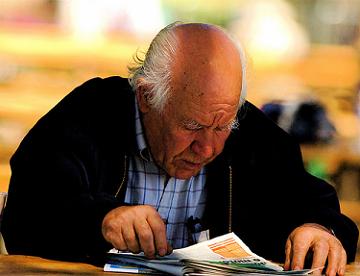Crowdsourcing
Last Friday I had an interesting conversation via Twitter with Jeff Howe.
Jeff is a writer at Wired Magazine and a Nieman Fellow at Harvard University. He coined the term “crowdsourcing,” and wrote a book on the subject last year.

Last Friday I had an interesting conversation via Twitter with Jeff Howe.
Jeff is a writer at Wired Magazine and a Nieman Fellow at Harvard University. He coined the term “crowdsourcing,” and wrote a book on the subject last year.
As our team is (a) constantly using this term in our back-end emails, and (b) continuously evolving the way we produce certain kinds of content via crowdsourced information, I’ve really enjoyed getting into Jeff’s blog / perceptions of media / technology. I found this article on The Pitfalls of Citizen Journalism really relevant to Matador, and particular, MatadorU.
I think the crowd make excellent sources and additional sets of eyes and ears, but I believe the future lies in carefully cultivated partnerships between professionals and their audiences. Examples: I’m a huge fan of Talking Points Memo and their TPMMuckraker project, am bullish on my colleague David Cohn’s crowdfunded journalism site, Spot.Us. Both let professionals work the phones and write the copy, but encourage the crowd to do what it does best (unearthing data and marshaling support for underreported stories, respectively)
For some reason I’m unable to fully decide on a position re: “professionals vs. citizens” when it comes to travel writing. Perhaps this is because to me travel writing is more a form of literary expression than a journalistic “endeavor.”
Last month I reported on the “community funded reporting” project called Spot.us. I was stoked to find this interview with founder David Cohn where he lays out plans to expand Spot.Us to several more cities in the US.
Another response to the changing economic model for journalism: declaring it a “public good” and subsidizing it by the government. This idea is the basis of a new book by University of Illinois Professor Robert McChesney and The Nation correspondent John Nichols, The Death and Life of American Journalism: The Media Revolution that Will Begin the World Again.
For more information, please read the recent interview with Nichols and McCheney at Democracy Now, part of which is excerpted below:
Robert McChesney:
we think we’re in a moment of crisis right now for journalism, not just the sort of the long-term crisis we often talk about and you chronicle on this program, but really a freefall collapse in which, in the next few years, the decisions we make will determine whether we even have journalism as it’s been known traditionally.
The business model that has supported journalism for the last 125 years in this country is disintegrating. There will be some advertising, but much less. There will be some circulation revenues, but much less. And if we’re going to have journalism in this country, it’s going to require that there be public subsidies to create an independent, uncensored, nonprofit, non-commercial news media sector.
And we argue in the book, as you said, that we actually have a very rich tradition of this. The first hundred years of American history, the founders did not assume the market would give us journalism. There was no such assumption at all. They understood it was the first duty of a democratic state to see that a vibrant, independent, uncensored Fourth Estate exist.
From the Public Domain Manifesto:
After decades of measures that have drastically reduced the public domain, typically by extending the terms of protection, it is time to strongly reaffirm how much our societies and economies rely on a vibrant and ever expanding public domain. The role of the public domain, in fact, already crucial in the past, it is even more important today, as the Internet and digital technologies enable us to access, use and re-distribute culture with an ease and a power unforeseeable even just a generation ago. The Public Domain Manifesto aims at reminding citizens and policy-makers of a common wealth that, since it belongs to all, it is often defended by no-one. In a time where we for the first time in history have the tools to enable direct access to most of our shared culture and knowledge it is important that policy makers and citizens strengthen the legal concept that enables free and unrestricted access and reuse.
In a previous mashup I linked to Edge which has interesting essays on the subject of public domain and the “threats of cloud capitalism.”
Please share your thoughts about the future of journalism in the comments below.